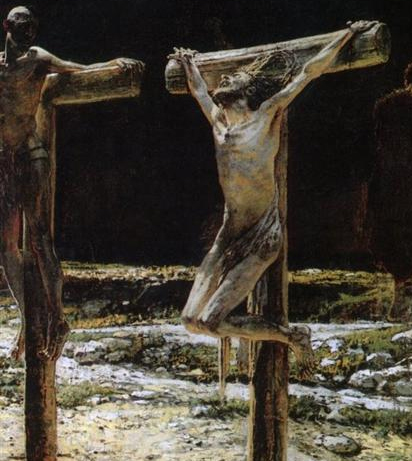Christian Art | Ritual Purity | Jesus And Jewish Law
Mark 7: 14-23 – Week 5 Ordinary Time, Wednesday (Audio Bible KJV, Spoken Word)
14 ¶ And when he had called all the people unto him, he said unto them, Hearken unto me every one of you, and understand:
15 There is nothing from without a man, that entering into him can defile him: but the things which come out of him, those are they that defile the man.
16 If any man have ears to hear, let him hear.
17 And when he was entered into the house from the people, his disciples asked him concerning the parable.
18 And he saith unto them, Are ye so without understanding also? Do ye not perceive, that whatsoever thing from without entereth into the man, it cannot defile him;
19 Because it entereth not into his heart, but into the belly, and goeth out into the draught, purging all meats?
20 And he said, That which cometh out of the man, that defileth the man.
21 For from within, out of the heart of men, proceed evil thoughts, adulteries, fornications, murders,
22 Thefts, covetousness, wickedness, deceit, lasciviousness, an evil eye, blasphemy, pride, foolishness:
23 All these evil things come from within, and defile the man.
In today’s Gospel reading, Jesus continues to teach the people the true meaning of purity. In preceding verses, Jesus has told the scribes they are hypocrites, with a mistaken idea of what truly constitutes prayer, who lead people through their teachings to distorted and false understandings of how to love God and how to do well by other people within the community.
In these verses, Jesus abolishes the Jewish dietary laws, declaring all foods clean, and too the purification rituals which preceded meals. These Jewish customs are now to be seen as empty observances. Food, Jesus tells us, does not defile a person. It is in a person’s heart that the evil lies. It is there that we must look as we seek spiritual purity, such as to allow us to hope to be, through God’s mercy, in the presence of God.
Tradition tells us that St Mark was the interpreter of St Peter and that, in writing his Gospel, he gathered up the teachings in Rome of the head of the apostles. (These and the surrounding verses of Mark’s Gospel are also paralleled closely in Matthew, chapter 15.)
We recall the vision St Peter had in Joppa, which showed him the full depth of what Jesus now teaches about food. This is recounted in Acts10: 9-16:
9 ¶ On the morrow, as they went on their journey, and drew nigh unto the city, Peter went up upon the housetop to pray about the sixth hour:
10 And he became very hungry, and would have eaten: but while they made ready, he fell into a trance,
11 And saw heaven opened, and a certain vessel descending unto him, as it had been a great sheet knit at the four corners, and let down to the earth:
12 Wherein were all manner of fourfooted beasts of the earth, and wild beasts, and creeping things, and fowls of the air.
13 And there came a voice to him, Rise, Peter; kill, and eat.
14 But Peter said, Not so, Lord; for I have never eaten any thing that is common or unclean.
15 And the voice spake unto him again the second time, What God hath cleansed, that call not thou common.
16 This was done thrice: and the vessel was received up again into heaven.
Through this vision, Peter is enabled to visit with and convert Cornelius:
28 And he said unto them, Ye know how that it is an unlawful thing for a man that is a Jew to keep company, or come unto one of another nation; but God hath shewed me that I should not call any man common or unclean.
Jesus’ abolition of the Jewish dietary regulations, therefore, has a greater significance. It means that the Gospel is to be preached not only to the Jews but to all the world.
Jesus’ words in these verses of the Bible sound a note of warning which is also of hope and promise. We are told that out of the human heart comes evil, and an ominous catalogue of evils follows: evil thoughts, adulteries, fornications, murders, thefts, covetousness, wickedness, deceit, lasciviousness, an evil eye, blasphemy, pride, foolishness. All this pollution can lie in a human heart.
We are asked by Jesus to look inside our hearts and to discover what is there. We are asked to be honest about ourselves. Yes, where we find evil present, we will feel disgust – indeed loathing of that evil – and this is a very unpleasant sensation. This, though, should not become loathing of ourselves. Rather, by being honest, by not being hypocrites, we are enabled by Jesus to confront and confess the evil and have it out of ourselves. We are not asked by Jesus to be terrified of the evils that can lurk in a human heart. Rather we are empowered to repent, through grace, and so to attain forgiveness. This is how we hope for purity, how we hope to be clean, fit vessels for Christian faith.
‘O my God, I am heartily sorry for having offended Thee, and I detest all my sins, because of thy just punishments, but most of all because they offend Thee, my God, Who are all-good and deserving of all my love. I firmly resolve, with the help of Thy grace, to sin no more and to avoid the near occasion of sin. Amen.’ (An act of Christian contrition.)
Concluding Prayer
Shed your clear light on our hearts, Lord
so that walking continually in the way of your commandments,
we may never be deceived or misled.
We make our prayer through our Lord.








